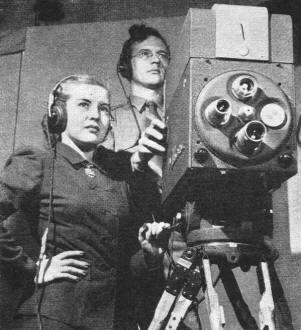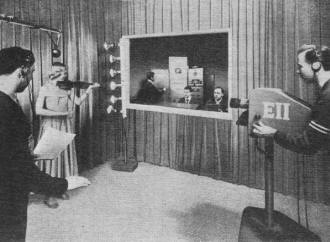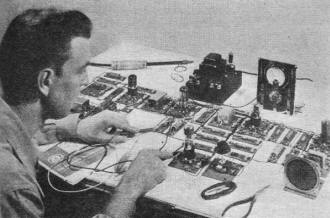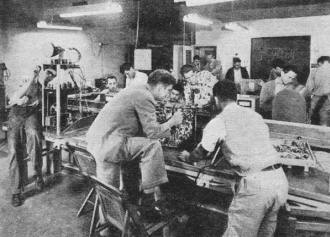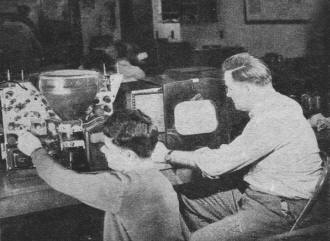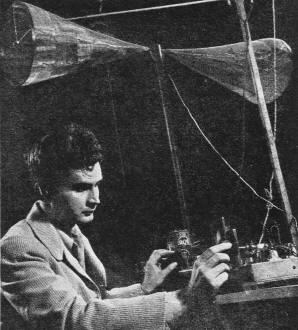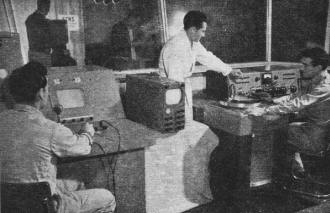Students of Today - Technicians of Tomorrow |
||
I was surprised to not find in this story any mention of military training as a possible pathway to a career in electronics. 1948, when this article appeared in Radio & Television News magazine, was a year when a plethora of highly trained and competent cadre of electronics technicians were available for exploitation by commercial industries. During the years of World War II, which came to a close in the Fall of 1945, most research, development, and production of high tech equipment resulted in major advancements in radio, television, radar, teletype, medicine, and creature comforts was operated and maintained by service personnel. Immediately after the war and even for many months prior to the surrenders of Germany and Japan, when the outcome became apparent, many commercial companies began training programs for accommodating a new era of technology for the civilian community. Students of Today - Technicians of Tomorrow Commercial video broadcast equipment at American Television. Inc., includes the latest RCA image orthicon camera links as well as iconoscope cameras for studio use by the trainees. By Charles Edward Chapel Many schools stand ready and equipped to help you get basic training in television. Only the uninitiated will contend that television is a subject that "anyone can pick up in his spare time." The complexity of modern television circuits, the high voltages encountered, and the delicacy of many of the component parts puts television out of the reach of the kitchen-table tinkerer or the casual experimenter. Television is a job for trained men who know what they are doing and why. The cost of the equipment alone, either at the transmission end or in the home, is such that the tyro is excluded from servicing work. The test equipment used in the servicing and aligning of television receivers is of laboratory caliber and, as such, needs the touch of the trained man. Of course, formal training in television is the only answer to the present problem of securing enough qualified technicians to service the hundreds of thousands of television sets already in use and to install the many thousands more receivers coming off the production lines. There are today in this country many well-equipped and fully-accredited schools where embryo video technicians may acquire the necessary know-how to enable them to competently service television receivers. Each of these schools offers many advantages to the prospective student; trained faculty, well-equipped technical libraries, modern laboratories and workshops where up-to-date test and servicing equipment is available, in addition to employment placement services which assist the graduate to find his niche. Television studio and a partial view of the control room set up at the Electronics Institute. Inc., in Detroit. Here students study some of the practical problems encountered in TV. Good laboratory equipment plays an important role in the training of future television technicians. At Central Radio and Television Schools these students check an RCA 630 TS receiver. Students unable to attend resident schools have a wide choice of correspondence courses. This DeForest Training, Inc., student can experiment with radio equipment in his own home. "Learning by doing" is one of the best ways to acquire a working knowledge of television. Here students at the Hollywood Sound Institute test their theoretical training in the lab. The demand for television servicing courses is at an all-time high. These students at Valparaiso Technical Institute work on commercially built receivers in the school's laboratories. This well-equipped technical library for students in residence at Capitol Radio Engineering Institute in Washington points up one advantage of formalized technical TV training. Many of these schools offer both day and evening courses for the benefit of students employed in other fields. Some of these courses are available to veterans under the G.I. Bill while still other courses can be pursued at home through "home study" or "correspondence" plans. According to the catalogues of the schools, courses are varied in length or can be tailored to suit the requirements of the student. Curricula cover from one year to 6 year courses which qualify the student as a television serviceman or lead to a degree of Bachelor of Science in Television Engineering. Many factors will enter into the student's choice of educational facilities; proximity to his home, length of course, type of training offered, availability for veterans' training, etc. In making any selection it is well to remember that the training received now will let you in on the ground floor of a new and growing profession. Investigate the courses that the various schools have to offer. Discuss your educational requirements with the registrars at the various schools. Professional advice on the selection of the proper school to meet your needs is available from Dr. J. S. Nofsinger, Director, National Council of Technical Schools, Washington, D. C. The thing to remember; however, is that the time is very near when thousands of television technicians will be needed and what you do now toward getting adequate training in the field will affect your future in television. The bandwagon is rolling now - the decision is up to you!
Television antenna equipment is no mystery to the student who can experiment with a variety of installations. American Television Laboratories of California provides such facilities. Control panels and other television studio equipment give students at the National Schools an opportunity to test their video knowledge under simulated TV transmission conditions.
Posted November 17, 2022 |
||

